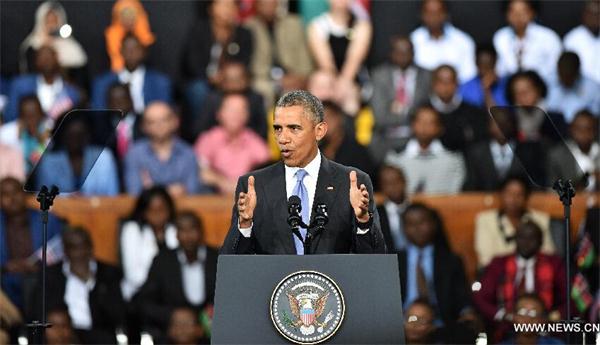Test of success in Africa will be judged by African people
Updated: 2015-07-27 08:51
By Han Dongping(China Daily)
|
||||||||
 |
|
U.S. President Barack Obama delivers a speech during his visit in Nairobi, Kenya, July 26, 2015. Obama visited Kenya, the birthplace of his father for the first time as president from Friday to Sunday. [Xinhua/Sun Ruibo] |
US President Barack Obama is in Kenya this week. It is his second visit to his father's birthplace, but his first as president, and the first visit to the country by a US president. He will also visit Ethiopia on his way back, becoming the first US President to visit that country as well. Altogether, this trip represents Obama's fourth trip to the African continent as president.
As the first African-American US president, Obama changed history in the sense of his personal success. But he has not changed much in the way the United States deals with Africa - or Third World countries as a whole, for that matter. Even though most of Obama's aides and advisers insist that Obama's personal connections to Africa have shaped his identity as a person, Obama as president has not done much to shape the US' legacy in Africa.
In his first term, he spent twenty-four hours in Sub-Saharan Africa. Perhaps besieged by his opponents' challenges that he is not qualified to be US president because he was not born an American citizen, Obama has seemingly gone out of his way to avoid any intimate connection with Africa. That is one of the reasons why his critics say that despite being the first African-American US president, he has done less for the continent than his white predecessors.
Like other US policymakers and despite his personal connection with Kenya and Africa, Obama doesn't understand the cultures and histories of African people. He has never really appreciated the aspirations of African people for development.
His foreign policy toward Africa employs the same rhetoric of "democracy and security" as his white predecessors. But under his watch, the security situation in Africa has worsened. Violence in Yemen has escalated because of civil war and in Nigeria as the Islamic extremist group Boko Haram extends its influence. It was also Obama who authorized the bombing of Libya, with two former colonial powers, the British and the French, which toppled Muammar Gadhafi's government, decimating the infrastructure of the country and completely destabilizing Libyan society. Libyan people, who enjoyed the best free government-provided medical care and educational opportunities in Africa, have had to flee their homeland.
The Obama administration's foreign policy toward Africa, like that of his white predecessors, has been a total failure. Its rhetoric of "democracy and freedom" fails to fully grasp the problems in Africa and fails to resonate in African countries.
During the Cold War, the US' involvement with Africa was mostly inspired by Cold War geopolitics. After the collapse of the Soviet Union, the US lost interest in Africa.
As China expands its development efforts in Africa, and as one African nation after another embraces China's efforts to support its development, the US has discovered to its dismay that it has lost Africa to China.
In response to China's success in Africa, the US and other Western countries have resorted to their old tactic in Africa of instigating violence and civil disturbances, and have sought to criticize China's support of African countries' development. Former US secretary of state Hillary Clinton even denounced China's efforts in Africa as neocolonialism without mentioning it by name. However, the test of success in Africa will eventually be judged by African people.
China is doing a good job in Africa because China has brought good things to African countries, which African governments and African people welcome. That is one of the main reasons why China is doing well in Africa.
African people were fooled by the West before, they will not be fooled again. If the US and the West continue to bring destruction and violence to Africa, like they have done in Libya and other parts of Africa, they will be doomed throughout Africa in the end.
The author is visiting professor of Hebei University and professor of Warren Wilson College.
- Global health entering new era: WHO chief
- Brazil's planning minister steps aside after recordings revelation
- Vietnam, US adopt joint statement on advancing comprehensive partnership
- European border closures 'inhumane': UN refugee agency
- Japan's foreign minister calls A-bombings extremely regrettable
- Fukushima impact unprecedented for oceans: US expert

 Stars of Lijiang River: Elderly brothers with white beards
Stars of Lijiang River: Elderly brothers with white beards
 Wealthy Chinese children paying money to learn British manners
Wealthy Chinese children paying money to learn British manners
 Military-style wedding: Fighter jets, grooms in dashing uniforms
Military-style wedding: Fighter jets, grooms in dashing uniforms
 Striking photos around the world: May 16 - May 22
Striking photos around the world: May 16 - May 22
 Robots help elderly in nursing home in east China
Robots help elderly in nursing home in east China
 Hanging in the air: Chongqing holds rescue drill
Hanging in the air: Chongqing holds rescue drill
 2.1-ton tofu finishes in two hours in central China
2.1-ton tofu finishes in two hours in central China
 Six things you may not know about Grain Buds
Six things you may not know about Grain Buds
Most Viewed
Editor's Picks

|

|

|

|

|

|
Today's Top News
Liang avoids jail in shooting death
China's finance minister addresses ratings downgrade
Duke alumni visit Chinese Embassy
Marriott unlikely to top Anbang offer for Starwood: Observers
Chinese biopharma debuts on Nasdaq
What ends Jeb Bush's White House hopes
Investigation for Nicolas's campaign
Will US-ASEAN meeting be good for region?
US Weekly

|

|







